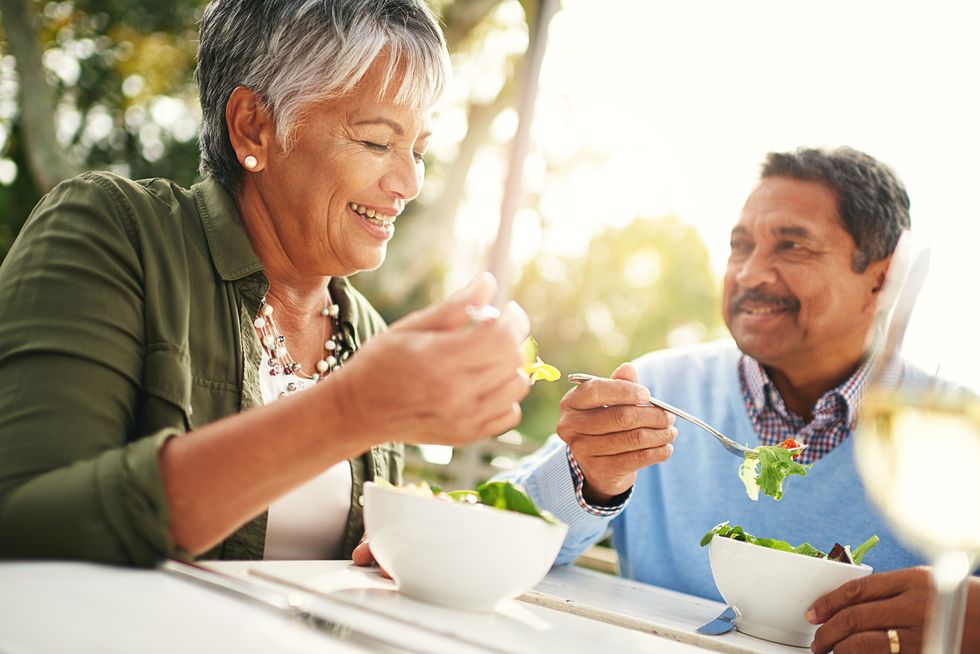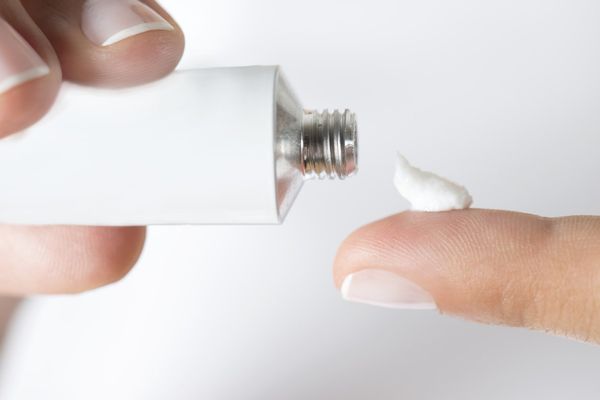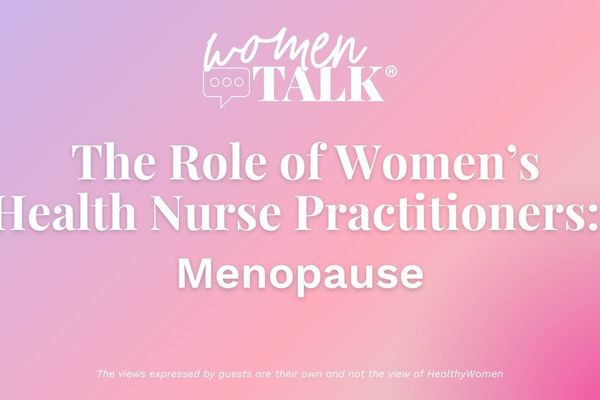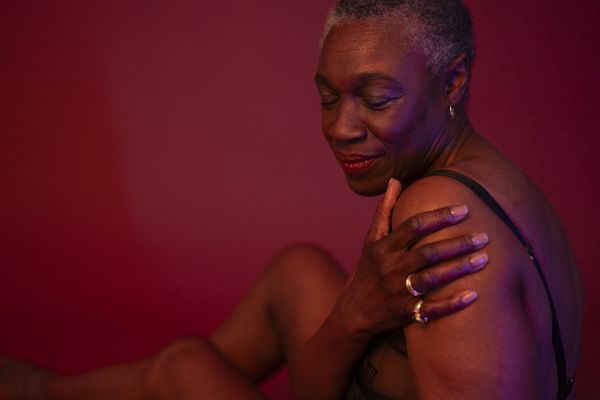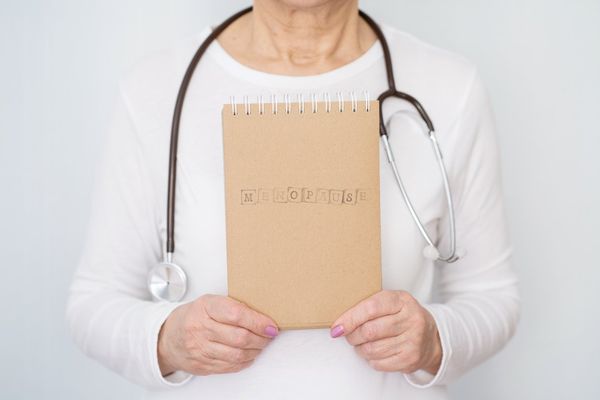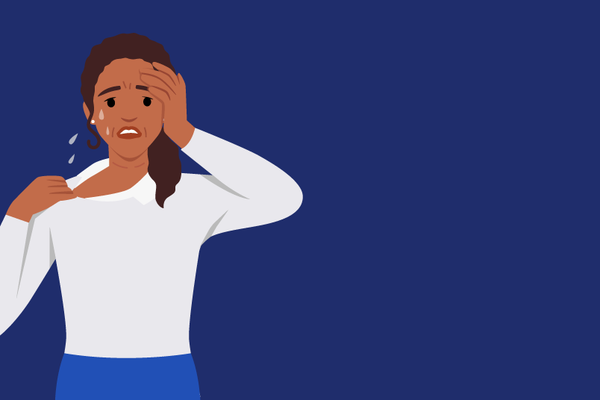During menopause, weight is easy to gain (in fact, some weight gain is almost inevitable) and hard to lose, for all the reasons we mentioned in this post: metabolic change, loss of muscle mass, hormonal change, sleep deprivation and stress.
So, if you're just entering menopause—heads up! Game-changer ahead! Women who enter menopause close to their ideal weight have a better chance of maintaining it; however, women who tend to yo-yo or who have a hard time maintaining a healthy weight will tend to end up at the high end of their weight range.
Whatever you did in your 30s to keep your weight in check isn't going to work anymore. You've lost about 20 percent of your muscle mass, and you need about 200 fewer calories per day as you enter your 50s and 60s. Forewarned is forearmed, as they say. Simply recognizing this fact may help you step away from the hamster wheel of yore and toward a regimen that works.
The good news is that the best weight management strategy—the one that will work for the long haul—will also keep you stronger, more flexible, healthier and capable of maintaining an active lifestyle for far longer. You'll be able to travel, garden, play with the grandkids, get up off the floor, carry heavier loads and remain generally pain-free.
The bad news is that it's hard. A realistic and effective strategy to maintain a healthy weight requires self-discipline and lifestyle change. For the rest of your life. As you've probably guessed, you have to get serious about exercise and your diet—how much and what kind of food you put in your mouth.
Sure, you can go on a killer diet or you can take medications that will help you lose weight. But you probably already know the drill here—without lifestyle change, you'll put it right back on and then some. Only now you're much more vulnerable to a host of serious, life-altering ailments, such as joint problems, diabetes and cardiovascular trouble.
So, let's talk about ways of eating that work for older women. We're not talking about draconian measures that you'll have a hard time maintaining. In fact, overly rigorous dieting can actually cause you to lose muscle mass and slow your metabolism even more, which is the last thing you need right now.
- Focus on fresh, real, homemade food. You need to consume fewer calories, but they need to be high-quality, nutritious calories. Think whole grains, fresh fruit and vegetables, nuts and legumes. Don't go crazy on low- and non-fat foods, which are unhealthy in hidden ways. Instead, go for the unsaturated fats in olive or sesame oils, avocados, nuts and salmon or tuna. Nutrient-rich, unsaturated fat "keeps your skin supple and your body from drying out. Basically, it's like putting lotion on your body but from the inside out," says Dr. Christine Gerbstadt in this article.
- Speaking of calories, a sedentary older woman in her 50s and 60s should consume about 1,600 calories per day. If you're more active, bump that up to 1,800 calories. To lose one pound per week, you need a daily 500-calorie deficit, either through diet or exercise. I'm thinking it's better not to gain that weight in the first place.
- Protein is important to replace muscle and protect bones, so eat 5 to 6 ounces of lean protein per day, such as that in dairy products, poultry and fish.
- The best diets for older women are the Mediterranean diet and the low-carb diet. Vegan and vegetarian diets are also good for weight loss and have been linked to greater longevity.
- In the beginning, a structured meal plan is helpful. Write down what you'll eat in the morning, so you don't find yourself peckish in the mid-afternoon and absentmindedly reaching for the cookies. Later, you can mentally plan your daily menus. Try to establish a regular pattern, so you get used to eating at about the same time each day.
- Avoid sugar, but don't be obsessive about it. If you're too rigorous, you may just be setting yourself up for a binge. An occasional treat is a nod to mental health.
- Alcohol (even in red wine) is not your friend. Alcoholic drinks are full of sugar and high in calories. One 4-ounce (half-cup) wine or beer per day is the limit. For spirits, it's 1.5 ounces.
- If you slip up, it's not the end of the world. Start fresh the next day. Just don't give up.
- Bariatric surgery is a highly risky last-resort, but it does work and may be less risky than years of obesity,
- Oh, and drink plenty of water.
"My body has changed, so I've got to change with it. I can't do what I did 20 years ago and expect to stay slim," says nutritionist and coauthor of The Full Plate Diet, Dr. Diana Fleming.
Staying fit and trim after menopause is no picnic, but feeling healthy, capable and in control of your life is worth every uneaten ounce of chocolate.
Read more about How to Win at the Losing Game.
Barb DePree, MD, has been a gynecologist for 30 years, specializing in menopause care for the past 10. Dr. DePree was named the Certified Menopause Practitioner of the Year in 2013 by the North American Menopause Society. The award particularly recognized the outreach, communication and education she does through MiddlesexMD, a website she founded and where this blog first appeared. She also is director of the Women's Midlife Services at Holland Hospital, Holland, Michigan.

